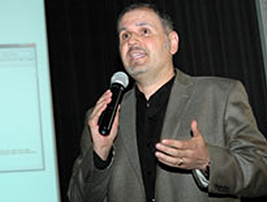Online Symposium showcases student engagement
If your classroom is like Pong, your students are bored. If it's like Pac-Man, which has 25,000 routes in which Pac-Man can travel to escape the ghosts, they will likely tune in.
Jeff Borden, vice president of instruction and academic strategy at Pearson eCollege, used this videogame example to illustrate how education must adapt to changing technology and learning patterns in order to serve the students of tomorrow. These are Generation M students – multitasker, media, multimodal, multinodal – and they want their education to happen anytime, anywhere and certainly not to be confined to the traditional classrooms and rote teaching styles of yore, he said.
Borden was the keynote speaker at last week’s CU Online Spring Symposium. About 100 faculty and staff from the University of Colorado Denver | Anschutz Medical Campus attended the all-day, 11th annual event at Tivoli Turnhalle.
Because Pac-Man involved strategic, not just reactionary, challenges for the player, it opened the floodgates to videogame design, said Borden, whose talk centered on the future of the technology-enabled classroom.
"There's a reason a new game is released every 2 1/2 hours," Borden said. "People need new things to stay engaged, to stay motivated. If your classroom is the same every day, your classroom is the equivalent of Pong. ... People need newness. They need things that are different and differentiated to stay engaged."
Driving his point further, he mixed music, video clips, audience participation and singing -- along with sobering statistics -- into his presentation. Among the statistics:
- In 2011, the average student lived 78 miles from their college or university; in 1980, they lived 5 miles away.
- Online course enrollment is growing an average 30 percent a year.
Borden noted that students are effectively learning about welding, cars, microscopes, cadavers, architectural software, bridge construction, foreign languages and many other subjects through low-cost web-based classes.
"Our students are requiring this," he said of online options. "Our students are starting to say, 'You know, if you don't have what I need I'll find it somewhere else.'"
Creativity and innovation are the most sought-after skills in the workplace, he said, but they get short shrift in the classroom. Teaching the traditional core competencies is no longer good enough, he said. Universities must deliver cultural, communication and technological competencies so that students can "connect the dots" between academia and the real world.
Borden said education must also:
- Stop ignoring research
- Offer cross-curricular courses
- Use real-life assessments
- Deliver personalized learning
A condensed way to look at it, he said, is "create, consume, remix, share." "This is what the experts say we've got to get through in order to fix education," Borden said. "If we can get our students doing that in a multimodal, multinodal way we are going to be successful."
The symposium included breakout sessions by faculty and staff on subjects including online lecture alternatives, the iPad as a teaching tool, and data analytics in higher education. It also featured, as has become custom, an entertaining student-produced video conveying the digital transformation of education.
Bob Tolsma, assistant vice chancellor for Academic Technology and Extended Learning, gave the symposium's opening remarks, highlighting the growth of open educational resources and online courses nationwide. He noted that a "massively open online course (MOOC)" offered by a Stanford University professor had 100,000 students enrolled worldwide.
With universities across the country developing online programs -- including all the Ivy League institutions -- online programs no longer struggle to earn legitimacy and respect, Tolsma said.
With events such as the CU Online Symposium, "there's kind of a celebratory thing that what you're doing is important," Tolsma said. "You don't have to worry about being thought of, online, as a second-class citizen."
For the second consecutive year, the symposium presented its CU Online Innovation Award. This year's winner is Brian Yuhnke, former instructional technology and web media production coordinator at CU Denver | Anschutz Medical Campus. Yuhnke, who now works at Case Western Reserve University, was cited for his creativity and ability to make learning compelling.


